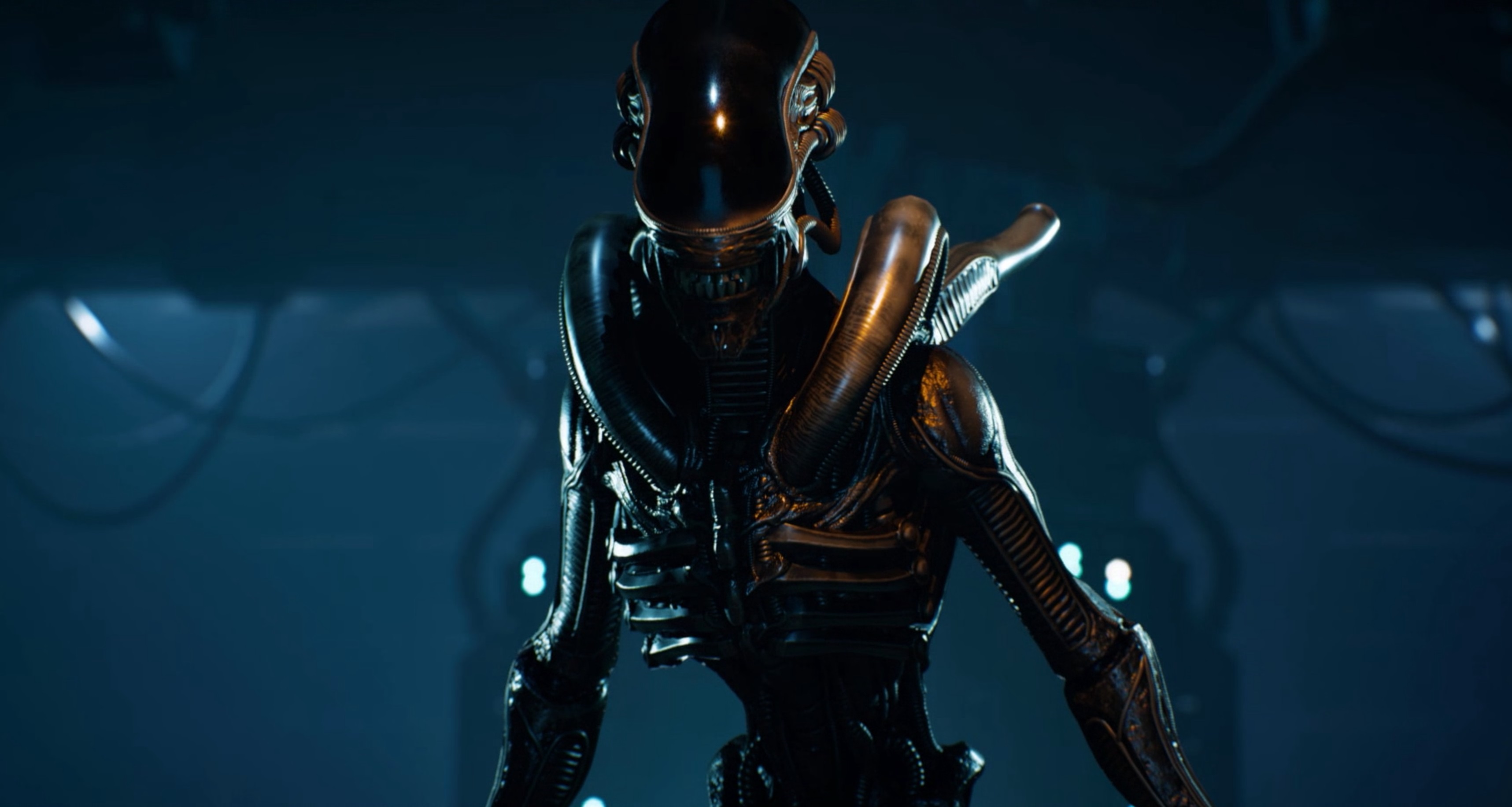
What is it? Hyper-tense real-time tactics game with a light sprinkling of strategy.
Expect to pay £29.99/$39.99
Release date Out now
Developer Tindalos Interactive
Publisher Focus Entertainment
Reviewed on AMD Ryzen 5 3600, Nvidia 2080 SUPER, 32GB RAM
Steam Deck Unsupported
Link Official site
It was all going well investigating the refinery, until I descended into the basement. The maze of mineshafts and storage rooms is a perfect hideout for Aliens: Dark Descent's xenomorphs, and my squad of Colonial Marines has been harassed relentlessly by H.R. Giger's phallic nightmare since entering. Now they're trapped. Huddled at the end of a narrow corridor, three of my marines burn through ammo to suppress the aliens' advance, while the fourth works on hacking a control panel to open the door behind them. But there are too many xenomorphs, not enough time, and no way to avoid them in this cramped steel tube.
Then again, that means they can't avoid Sergeant Kurtz's shotgun.
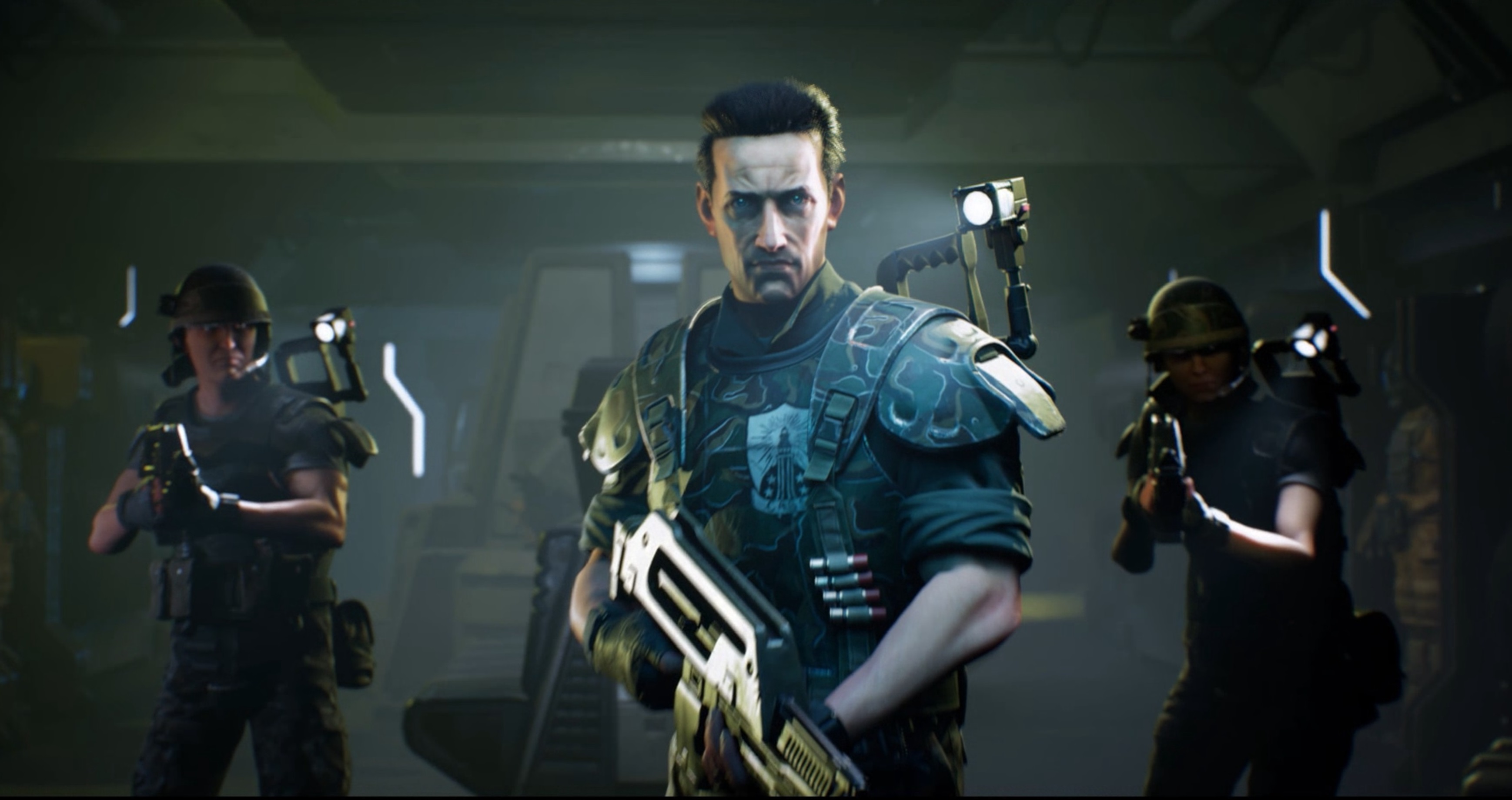
With the xenomorphs inches away, Kurtz unleashes a barrel of buckshot at point blank range. It doesn't kill the hulking Praetorian leading the charge, but it does stun it, giving Tekker MacDonald just enough time to crack the door code. My squad scrambles through the aperture, and I instruct Corporal Sainz to fill the corridor behind them with cleansing fire. Still the xenomorphs rush on, shrieking as they burn. But a well-placed grenade from MacDonald's pulse rifle finally puts the bastards down.
It's a miracle my marines survived the encounter. But they won't survive the next one. They're exhausted, acid-burned, running low on equipment, and so frightened they can barely shoot straight. I'm minutes away from completing the mission, but I give the order to retreat anyway. Tomorrow I'll return with fresh troops and finish the job. The xenomorphs will be stronger, too, but that's a risk I'll have to take.
Many games have tried to replicate the slow burning tension and chaotic action of Aliens, but Dark Descent is the first game since Monolith's AvP 2 to really nail it. Developer Tindalos Interactive has thought intensely about how to get the best out of James Cameron's film in a virtual context, and their solution is a scintillating real-time tactics game that blends stealth, strategy, and nail-biting gunfights.
Less yapping, more shooting
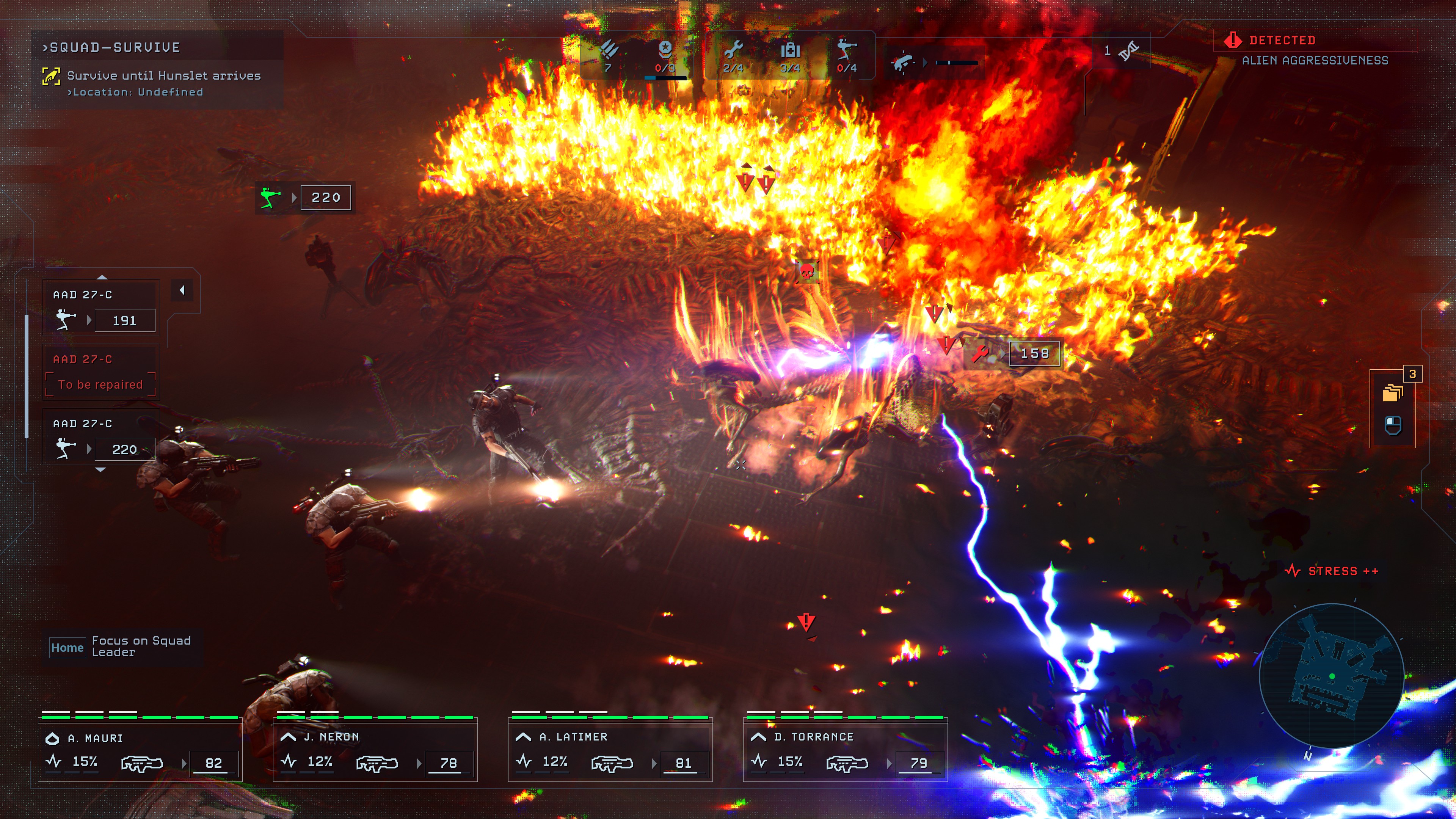
Dark Descent plays its weakest card first, so let's do likewise and get it out of the way. The game takes place on Lethe, a xenomorph-infested moon owned by the OG tech-startup Weyland Yutani, and where the Colonial Marine frigate U.S.S Otago has had the misfortune to crash-land. The cause of the crash is detailed in an elaborate, story-driven prologue that doubles as a tutorial. Tindalos Interactive has a decent cinematic eye, and Dark Descent captures the aesthetic and soundscape of both Scott and Cameron. But the script lacks the same wit and subtleties. A mess of forced conflicts and awkward dialogue, it's a draining parasite hidden in the game's chest, just waiting to burst out with a clanging line or an incongruous emotional outburst.
Once stranded on Lethe, however, the stories you create more than compensate for the narrative shortcomings. Each mission of the linear-ish campaign sees you dispatch a four-person team of marines to locations around Lethe, either to improve your situation or investigate why the moon is overrun with bugs. The first of these takes you to a facsimile of Hadley's Hope named Dead Hills, a sprawling shake 'n' bake colony with numerous buildings laid out on multiple floors. There's a bar, an armoury, a clinic, a command centre, and underneath it all, a twisting warren of mining tunnels.
Unlike most tactics games, you control the entire squad simultaneously, moving them around with the right-mouse button and interacting with environments using the left. It seems odd at first, but makes sense once you realise just how vulnerable your marines are when isolated. As you skulk around the mission, exploring buildings and highlighting interactable items with your shoulder-lamp, your motion-tracker in the bottom-right of the screen tracks any movement in a 60-metre radius. Whenever possible, you want to avoid the skittering white dots it highlights, not just because xenomorphs are an intensely bad hang, but because whenever you encounter them, it'll be worse than last time.
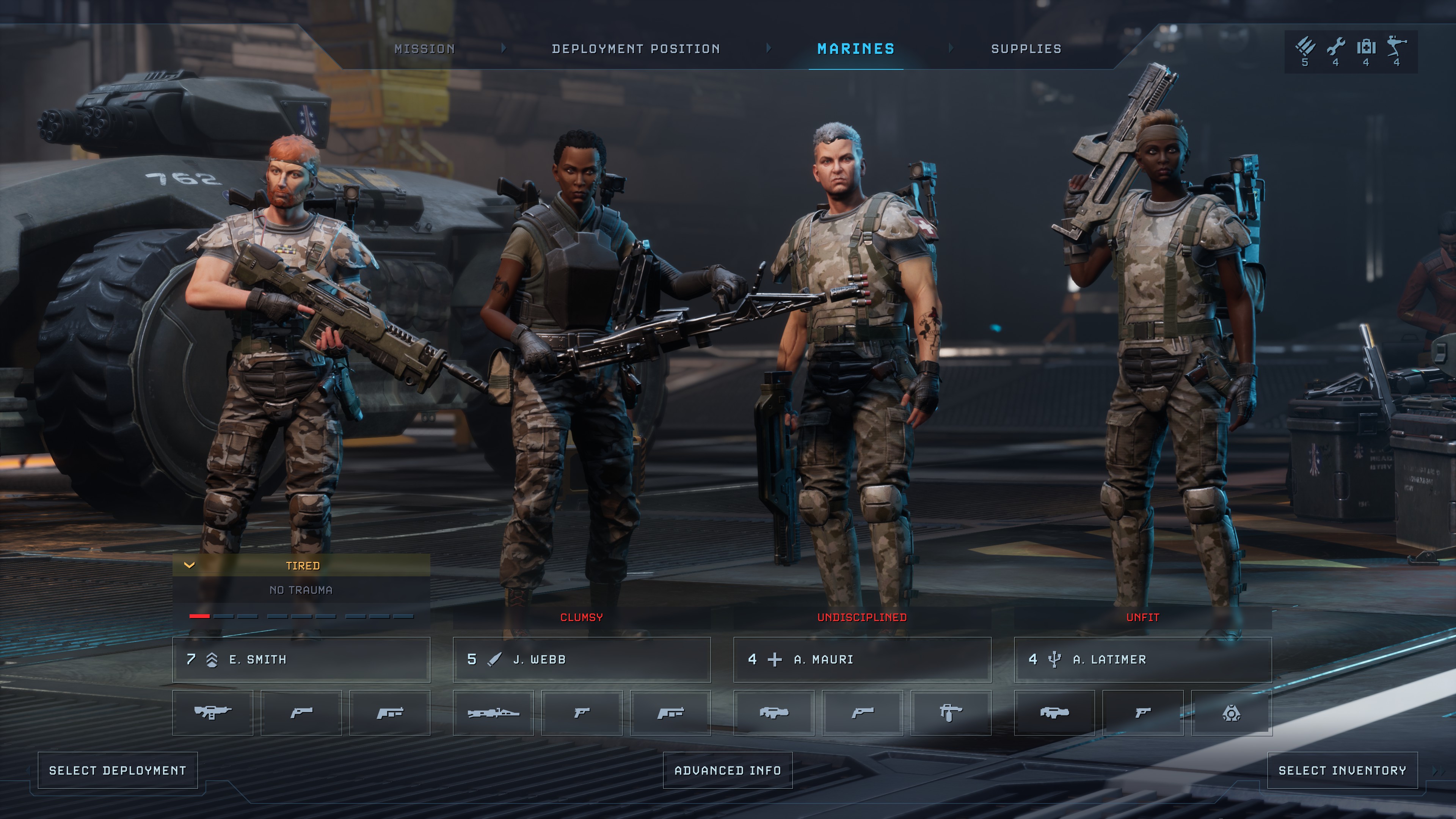
When a xenomorph spots you, the hive is stirred and they go into hunt mode, homing in on your location. Your squad will automatically shoot to keep the creatures at bay, but that alone is rarely enough to stop them. Hitting spacebar opens up a more elaborate skill menu. Suppressive fire will slow encroaching aliens in a wide cone, while grenades and shotgun blasts are useful for eliminating specific threats. But using these skills costs Command Points, and by default you only have a pool of three. They regenerate automatically, but the rate is slow.
Hence, Dark Descent's tactical fundamentals involve deploying these abilities effectively, knowing when to stick and when to twist. Yet no matter how well you fend off the xenomorphs, there will be lingering consequences to the fight. Every attack increases alien aggressiveness, represented by a creeping ticker in the top right of the screen. When this shifts up a gear, not only will more aliens prowl the mission area, they'll also send a massive horde in your direction.
But these attacks also increase your squad's stress levels, making them shoot more wildly and consume more ammo. They can reduce stress by popping Naproleve pills, or welding the doors of a room shut for a quick rest. But both consume vital resources.
Bug spray

All this combines to create a thrilling rollercoaster of tension, where a single xeno wandering into a room can spiral into an intense, protracted battle that could leave your marines terrified, maimed, abducted, or plain old dead. And all of this is before you think about completing your objectives, which are often as multilayered and uncompromising as your battles with the xenomorphs. In Dead Hills, for example, you'll need to locate the command centre, and use it to locate a half-dozen missing colonists, escorting each one from wherever they're hiding to your ARC. It's vast, relentless, and exhausting, to the point where you probably won't finish it in one sitting. Indeed, a key element of Dark Descent is knowing when to pull the plug on a mission, and retreat to the Otago to lick your wounds and send back a fresh squad the next day.
When you return to the Otago, Dark Descent becomes more of an XCOM clone, using a basic facsimile of that game's strategy layer to manage your marines. Here you can treat their wounds (both physical and mental), promote them to unlock new skills, furnish them with better weapons unlocked with resources gathered during missions, and research new technologies using xenomorph samples. It's light compared to XCOM's strategy layer, and much more derivative than the way missions play out. But it serves an important purpose. Most crucially, each passing day increases the infestation level of Lethe, so every time you give your marines a break from a mission, you risk it becoming more dangerous when they return.
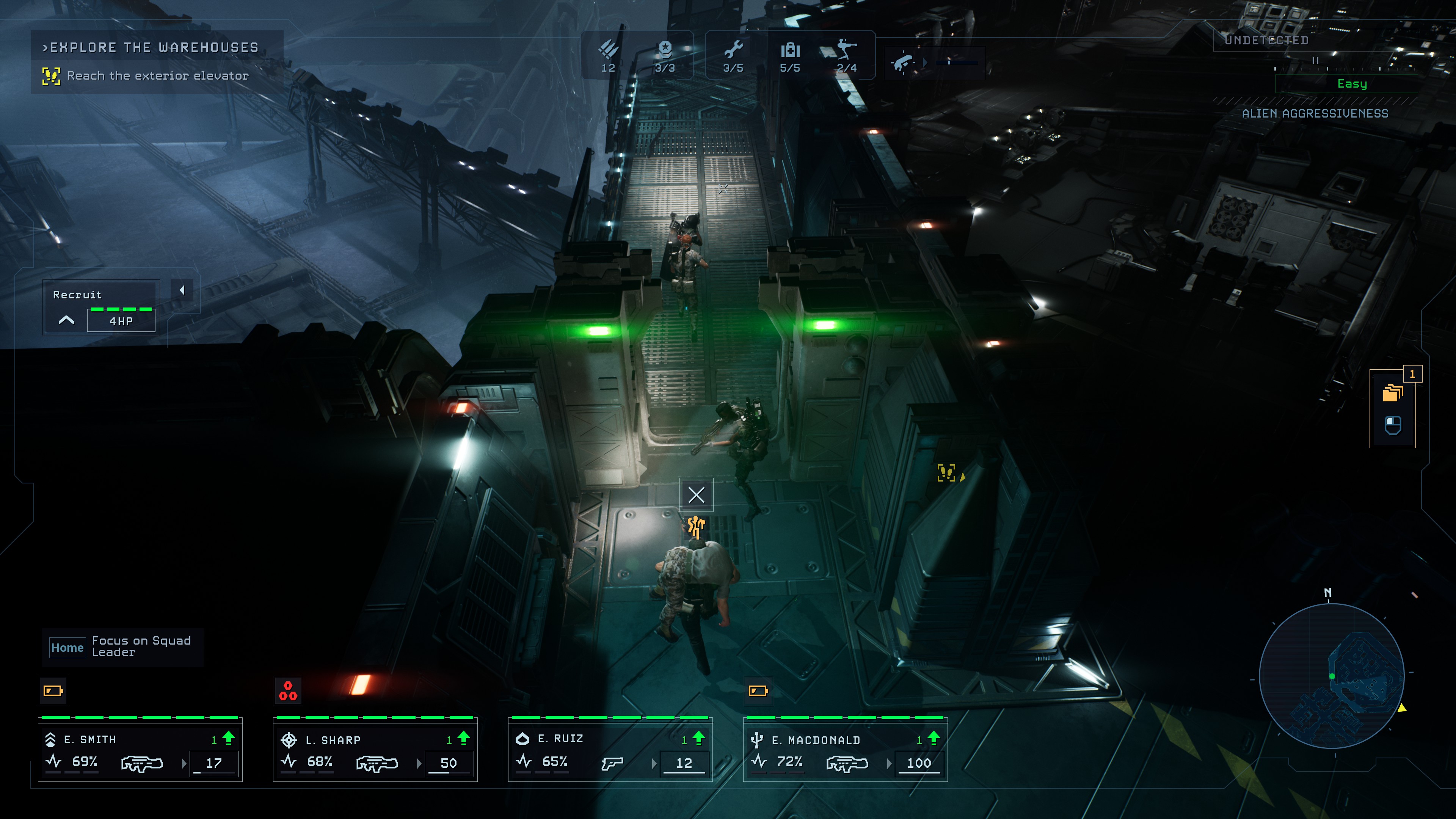
It's a fascinating mixture of ideas that creates tons of emergent conundrums. This occurs both at the small scale, such as choosing where to set up your defences when an alien onslaught is imminent, and the larger scale, like using a day to return to a previous mission to pick up additional resources and collect those broken sentry turrets you left behind. There are a few smaller problems, like marines occasionally getting stuck on world geometry, and the highly repetitive barks of your squad. But it's only in the storytelling where the quality noticeably dips.
Is Dark Descent to Aliens what Isolation is to Alien? In how it builds the best game it can out of the themes and ideas of the film it is based on, yes, absolutely. The execution isn't quite as successful, but it isn't far off, and even with those narrative shortfalls, it's still the most enjoyable and authentic Aliens game I've played.







